I took my Ancestors to the United Nations, and shared why storytelling is the sacred medicine ocean governance needs

After my speech, my son wrote a WhatsApp message and said “I remember when I asked you about your dreams and goals during 21 days meditation. You said one of your dreams is to get international recognition or platform. This was way before you were called to speak at UN… that’s crazy mom!”
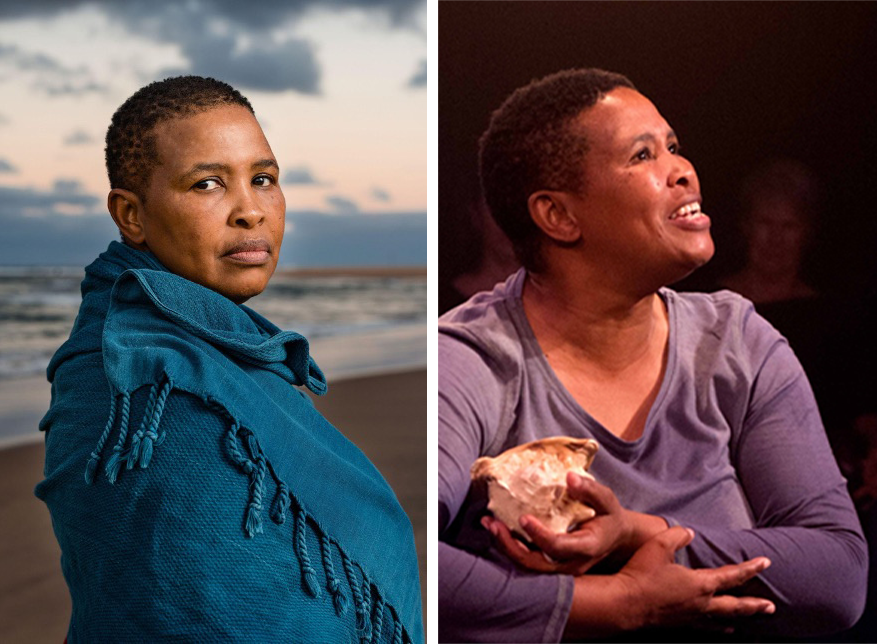
Photo: Jacki Bruniquel (LEFT) & Kelly Daniels (right).
I could have never imagined that the United Nations Headquarters would be the international platform I would receive that recognition. When I received an invitation to speak at the United Nations Headquarters in NY, as part of the UN World Oceans Day official programme, I was taken aback. I was nervous and terrified, thinking what was I going to say and in fact did I read correctly the invitation, was it really me who was invited? Mpume Mthombeni from the township that has been invited to this prestigious event at the UN Headquarters! I kept pinching myself and thinking what is it with me that inspired this invitation? I called my ancestors and told them “I am being invited to address the UN dignitaries, please help me.”
My speech was entitled “Why storytelling is the sacred medicine ocean Governance needs”, a speech I co-developed with a dear colleague and a friend, Dr Dylan McGarry, who I co-founded Empatheatre with. As Empatheatre colleagues, we do everything collaboratively, it is our central practice. We do collaborative story listening, story-making, and storytelling. Dylan helped me with everything; from checking the grammar in my speech (English is my second language) to thinking how to construct my story for the UN audience. Dylan also helped in syncing everything together; my voice with the moving images behind me from our recent film “Indlela Yokuphila: The Soul’s journey”, which debuted internationally on the day of my speech. Dylan essentially held my hand throughout the whole process from beginning to the end, and I can never thank him enough, he is my hero.
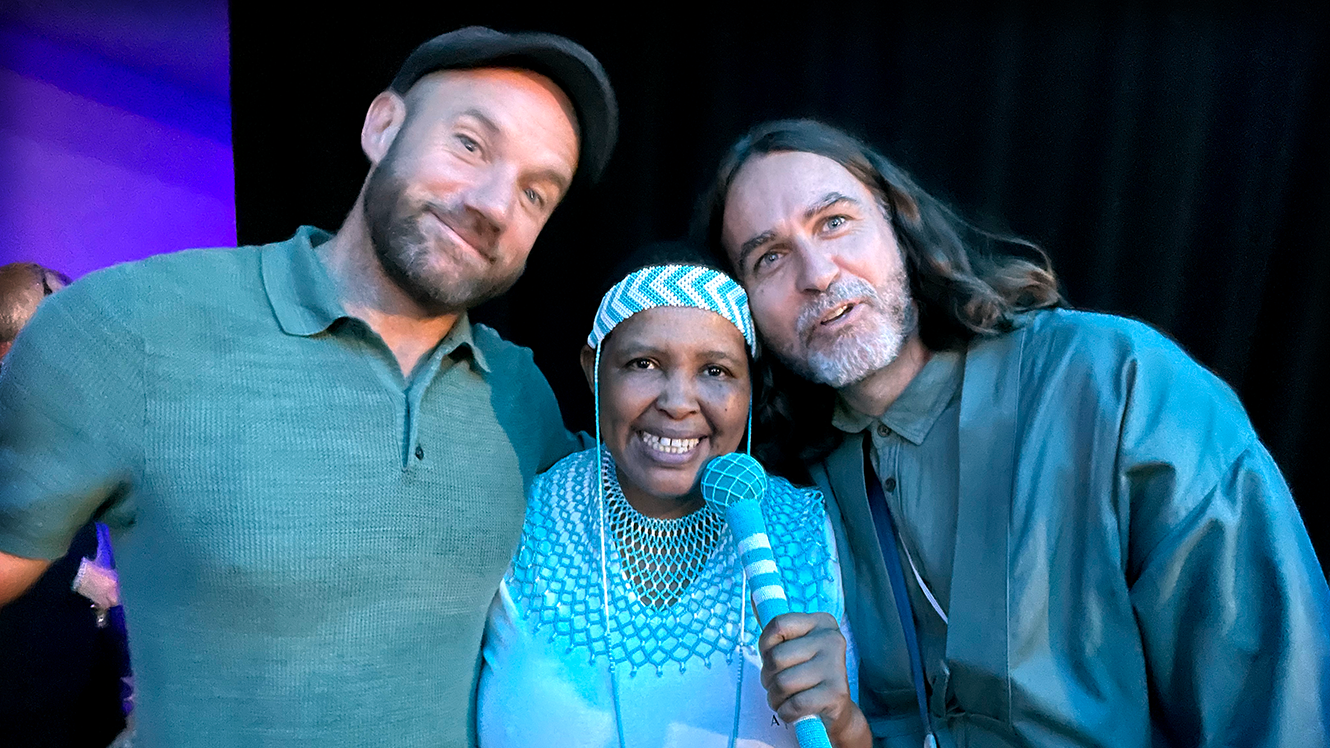
When I arrived at the UN Headquarters, I was blown away. I always see these spaces on the news, and never thought one day I would be sitting at a designated chair with such important people, waiting to give my speech. Sitting on that chair, the anticipation was killing me. I had my speech on paper, I kept looking at it and practicing. I watched other speakers going through their speeches with ease and I wondered about mine, thinking “how is the house going to receive me? Will they understand my message? Because most speakers were talking about science and here I was talking about storytelling as a sacred medicine…who will hear me?”
I am a performer, so I told myself that I’m going to treat this as a performance, so I geared myself up and got into character. And when I was introduced, I knew there was no turning back, the show had to go on. I began to sing the song I had created for the event, and the song helped in getting into the correct frequency, and I felt my ancestors taking me deep…I now had an sacred army with me. The nerves flew out the window, by body relaxed and I slowly made my way through the audience. My ancestors took over with each step… physically people saw Mpume Mthombeni on the stage, but it was not only me, it was the work of my ancestors doing their “muthi” (medicine) through me.
My speech in full:
(Singing while walking to the podium)
I remember the first time the sea spoke to me…. The more I followed the voice, the more, the currents began to tug and pull at my legs until my feet could no longer feel the sand (pause)…. just as I was about to fall into a deep-sea-dream (pause) I felt the bony grip of uGogo pulling me back to the surface.
“Haibo?” Gogo yelled “What were you doing in there? Remember what I have told you. Our ancestors are living down there. Sometimes their voices are so strong, that you will not even realise you are swimming out past the waves to reach them.”
“What will happen to me there Gogo?
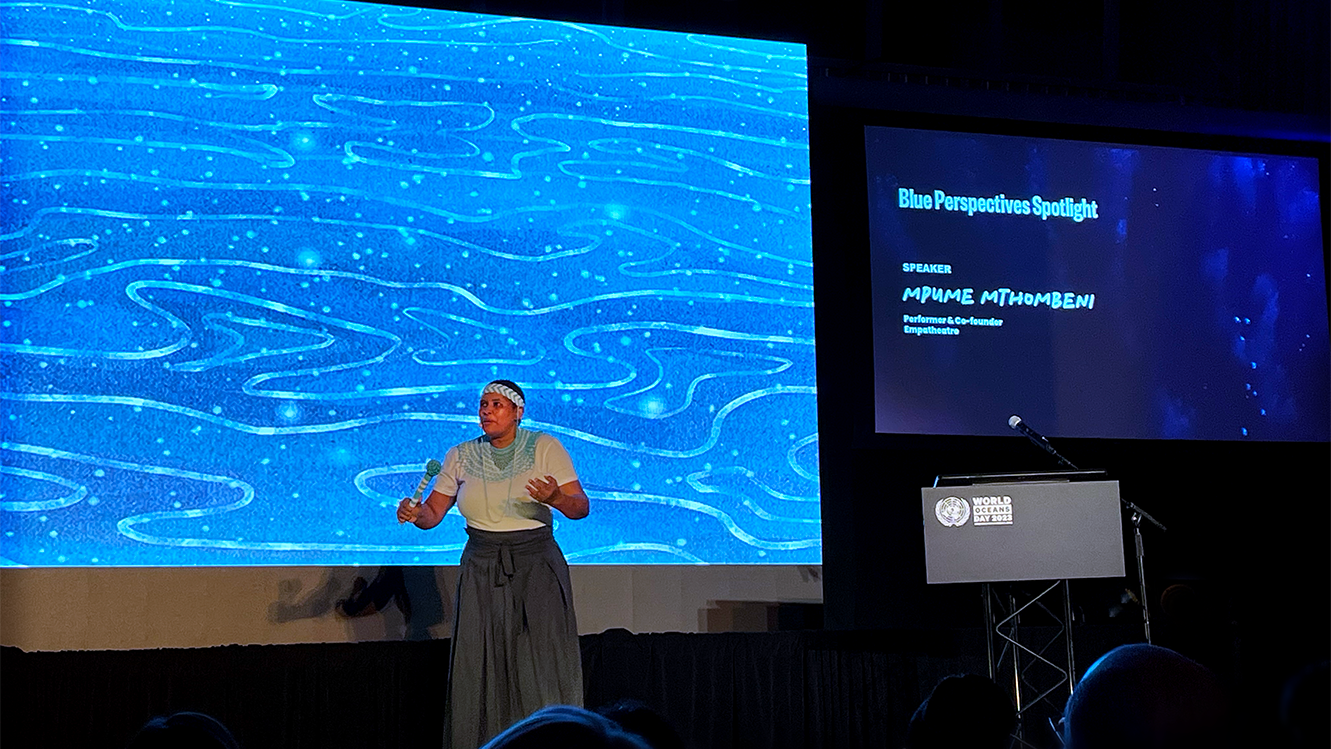
“They will take you under and they might choose to keep you. When you go down there you will find very old dark women who live there, uGogo abadala. Uphehla Ukhamba. When you first arrive they are waiting to receive you. They will know exactly whose child you belong to.
When I first was called, I was met by my great great grandmother who was waiting for me with her mouth wide open. “Go in child” said the voice of my mother…” Don’t be frightened.” When I entered, it was like I was walking through big doors of a house. Just like that story from the bible where uJonah is swallowed by a fish. The difference is that when you go inside, you embrace the great powers, ubanamandla amakhulu and your mind moves to another level. But wena, you are not yet ready for this… it is not yet your time.”
This is a scene from our Empatheatre play: “Lalela ulwlandle: Listen to the Sea”. My name is Mpume Mthombeni, I was born and raised in uMlazi, a township in Durban South Africa. I am a healer, a Sangoma- I use words and stories like this one to heal. I remember when I was young, ngisamncane, I used to visit Sangomas in the neighborhood, they would teach me how to beat the drum, how to dance, how to learn from my dreams. I remember one old Sangoma telling me how people would go thwasa in the sea, how they would be carried by the cloud to the sea towards their ancestors. How do they get into the sea? (Zulu translation). I have carried this question with me my entire life.
I could have never imagined answering this question through our theatre methodology Empatheatre, that the answers would keep flowing with new understanding like the tides and phases of the moon. Over the last decade our public storytelling has created amphitheaters of empathy, extra-legal tribunals where we can bring our different ways of knowing, being and doing together, and make new decisions, create new laws and policies in different context. Our play “Lalela uLwandle” has been co-created with traditional healers, small scale fishers, scientists, children, lawyers, policy makers, educators and others… it has toured up and down our coastline, performed at international policy events like COP27, and the headquarters of FAO and now the UN here.
This play and our short films have been used as evidence in court cases against big oil companies and ministries of minerals and energy, who are selling our ocean without our consent, without thinking of our ancestors. These stories were included as evidence of intangible heritage of our fellow indigenous fishers and coastal people’s and last year we won three court cases in a row. I am here today to call all the policy makers, all the decision makers – align with the storytellers, the healers and lovers of the ocean who have words, and images, dreams and memories, who can speak to the ocean, and also know how to listen to her needs. Our stories are the sacred medicine, umuthi that ocean decision making needs. Storytelling, and story-listening dissolves the barriers and disconnections between disciplines and departments, it sculpts new evidences, new ways of making meaning with the ocean. Listen to us, we know the sea.
Siyabonga.
(Singing while I walk through the audience returning to my seat)
after the speech
I came back to consciousness when I was walking back towards my chair and had to bring myself back to reality. My talk was interrupted by three rounds of applause throughout the talk. I was so moved to receive a standing ovation, and later I was told that I was the only speaker to receive such a blessing by the audience. I had never expected it, I didn’t know what to do and how to feel, I just cried…
I thought of my mother, father, sister, brother, nephew, and my niece who are all now on the other side, my ancestors. I felt all kinds of emotions all at once, happiness, sadness, excitement, pride, and that fulfillment that ‘Wow, I have done it’, and the atmosphere in the room was just awesome – it is something I have never experienced in my entire life. And I thought to myself “now this is a new chapter of my life”: speaking from my heart at an international policy making arena. It kind of felt like I was promoted at work, but instead of receiving the promotion from a boss or someone above me, it was given to me by my ancestors, and my global community.
After the speech everything was a blur; cameras flashing, our pictures taken on stage, standing with delegates as the camera flashes blinded us whilst smiling from the depths of our souls, the words of appreciation from the delegates, people congratulating me, people being moved by the speech and some even cried with me! People took my number, gave me their business cards, and saying “You can call me anytime, Mpume!” People knew my name. People from all over the world were listening to Mpume Mthombeni.
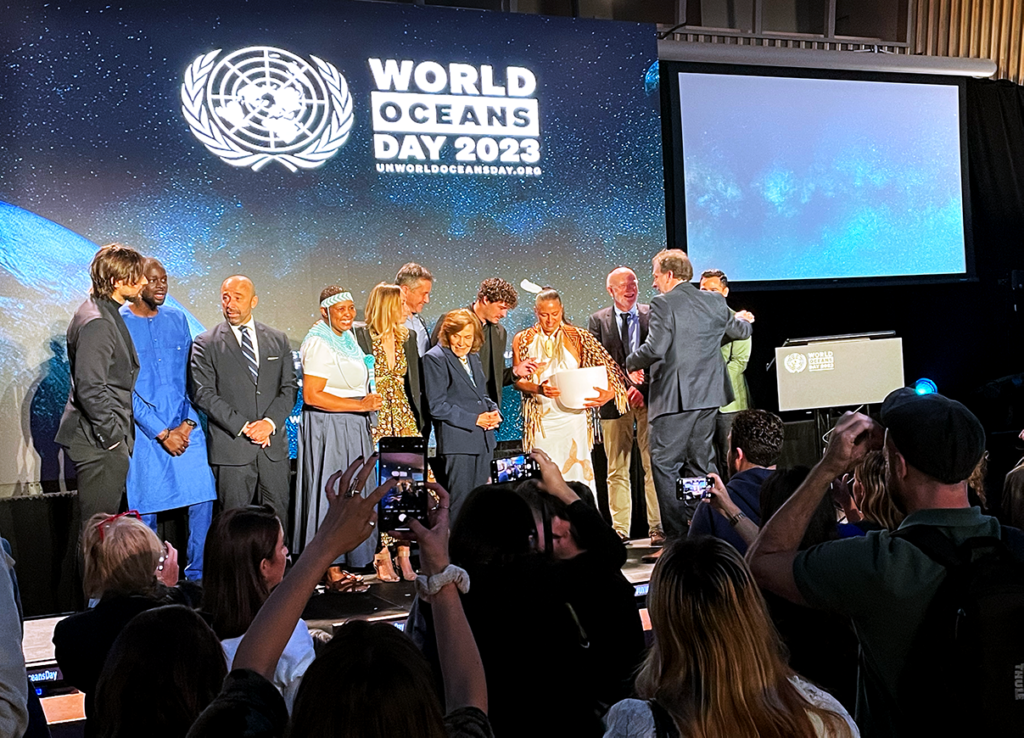
We also got to perform our play Lalela Ulwandle at the United Nations Plaza, at an event co-organised by the One Ocean Hub, Peace Boat and Blue Planet Alliance. The response from the audience was so moving, so engaged and thoughtful. It was so powerful to see decision-makers speaking from their hearts and not just from their heads about the issues that affect our people so deeply and so profoundly. To actually realise that these South African stories -that are so particular to Kwa-Zulu Natal area – resonated with everyone in the room. It was powerful experience, that I shared with Empatheatre colleagues Rory Booth and Alison Cassels – the feeling that, everyone related to the stories we shared, it felt that we were all in the same boat of trying to make a difference in this world.
I gave me comfort seeing the younger generation speaking about saving the oceans. It gave me hope that at least we will leave this earth with young people who will continue where we left off.
Acknowledgements
To my beautiful sons, who are my greatest teachers, and to my brother and other co-founder of Empatheatre, Neil Coppen, who has worked with me for over two decades. His direction, his writing, his constant support and love made this all possible. Special thanks also to Dr. Kira Erwin, who has been an incredible sister, and collaborative researcher, guide, and guru. We are deeply grateful to the Environmental Learning Research Centre, at the University Currently Known as Rhodes University, especially Danel Janse Van Rensburg, for her help with Empatheatre. Thank you to Tharshnie Ramasami at the Urban Futures Centre at the Durban University of Technology (DUT), for all her hard work with getting us across the ocean. Deep-deep gratitude to my fellow performers Rory Booth and Alison Cassels, and our incredible production manager and co-producer Marí Stimie, who is always beside us helping us. We are so grateful to Prof. Elisa Morgera, at the One Ocean Hub, who has paved so many ways for us in these international spaces, and her wonderful team, Hub manager Pippin Searle, and Clair McCelland – who got us to NYC. All my love.
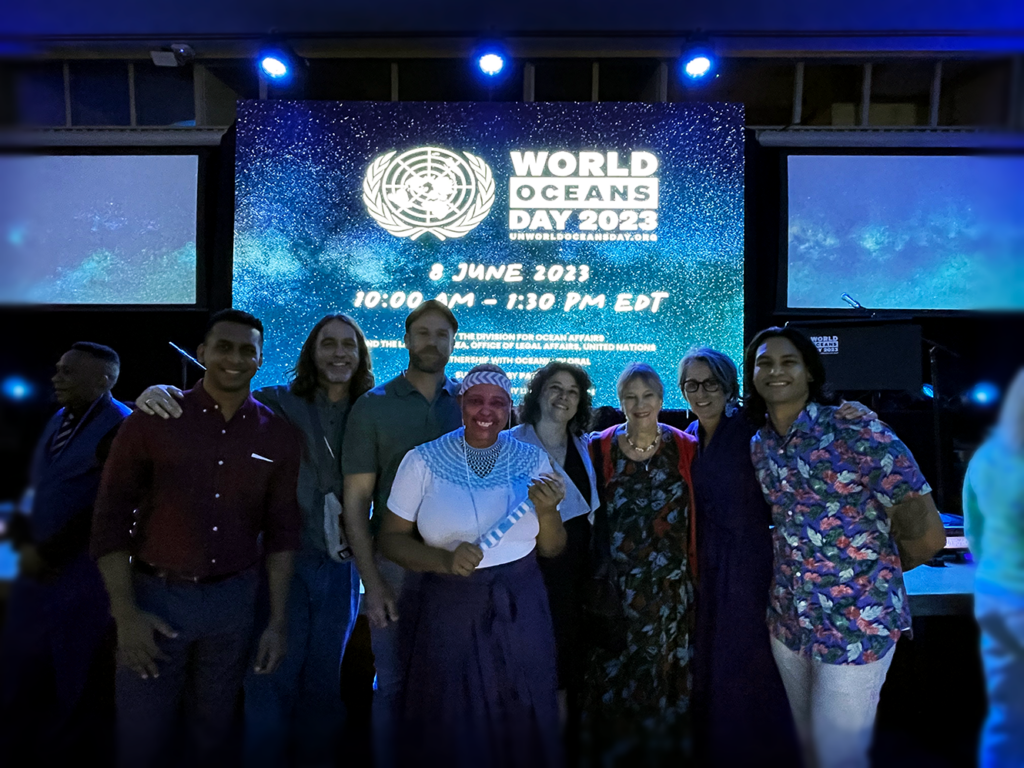
Mpume Mthombeni co-authored an article titled ‘Deep sea decisions can consider Indigenous knowledge’ together with Dr Dylan McGarry and Prof Elisa Morgera – read the article here.
Related SDGs: